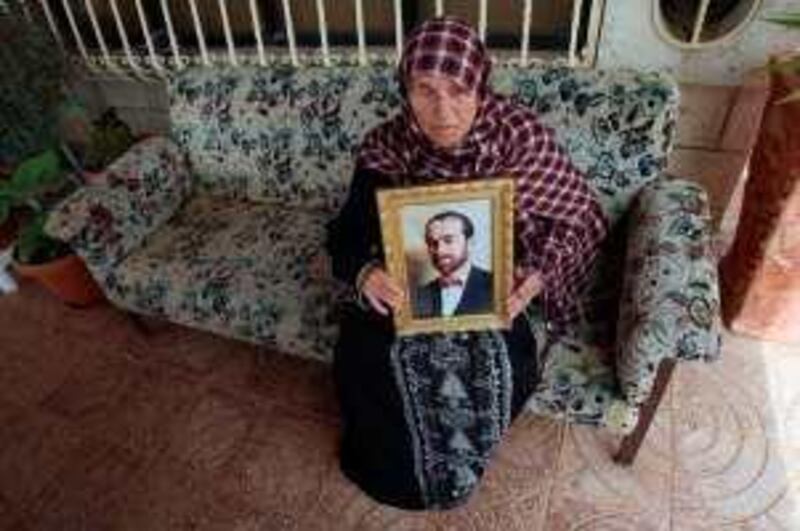GAZA CITY // The arrest by Israeli forces of a senior Hamas commander in the West Bank on Saturday night has political rivals Hamas and Fatah trading heated words over what Hamas claims was Fatah's role in the operation - and may undermine recent steps toward reconciliation. Maher Uda, 47, who was wanted by Israel for over a decade for his alleged involvement in a number of deadly attacks against Israelis, was arrested in a late-night raid in the West Bank's political capital of Ramallah, an area under the control of Palestinian Authority (PA) security forces loyal to the Palestinian president Mahmoud Abbas.
The Hamas spokesman Fawzi Barhoum told the AFP news agency that the arrest was "the fruit of dangerous security co-ordination between the Palestinian Authority and the [Israeli] occupation, because he was wanted and hunted by both parties". "The continuation of this security co-ordination is going to bury reconciliation alive because it comes in the context of uprooting Hamas and strengthening Fatah," he said.
There was no official comment from the PA, but a Fatah official, speaking to AFP, yesterday said of the arrest that Hamas was in denial over the "informers within its ranks". Hamas and Fatah have been at odds since they fought a series of battles on the streets of Gaza in June 2007. Hamas fighters routed secular Fatah forces aligned with Mr Abbas, leaving Hamas in control of the Gaza Strip and Fatah of the West Bank.
Since the division, Hamas has charged Fatah with "collaborating" with the Israeli occupation to the detriment of the Palestinian cause, while Fatah denounces Hamas as a pawn of the Iranian government, from which it gets substantial military and financial support. "Perhaps the Palestinian Authority didn't give the Israelis any specific information about Mr Uda, but they also decided not to protect him," said Assad Abu Sharakh, a Gaza-based political analyst and professor at the strip's Al Azhar University. "Either way, after the unclear circumstances of the Mabhouh assassination, this is another blow to Hamas. It may not be a serious one, but it is undoubtedly a blow."
Mr Uda's capture comes on the heels of the assassination of the top Hamas leader Mahmoud al Mabhouh in Dubai in January, after which two Fatah-affiliated suspects were also reportedly extradited from Jordan and questioned by Dubai authorities. The Dubai police chief Dahi Khalfan al Tamim also called on Hamas to carry out an internal investigation into whether or not one of its own leaked the militant's travel plans to the Israel's Mossad spy agency, widely believed to behind the attack.
Egyptian-led efforts to forge a unity government between the two factions have so far failed to produce a solid agreement, even after a high-profile visit to Gaza by the senior Fatah leader Nabeel Sha'ath in February was largely seen as a move that would jump start stalled reconciliation talks. Fatah signed in October a reconciliation document drafted by the Egyptians and aimed at resolving contentious issues between the two - such as a joint Hamas-Fatah security force for Gaza, a reconstruction committee for the territory and, eventually, Palestinian presidential and legislative elections.
Hamas, which won an upset victory in Palestinian legislative elections in 2006 but whose parliamentary term expired in January, has so far refused to sign the document. "This [arrest] will definitely affect the reconciliation process between Hamas and Fatah, because one of their leaders was arrested on Palestinian territory," Mr Abu Sharakh said. "It has again planted the seeds of mistrust in the minds of each party, and they will step up their accusations against each other, putting reconciliation off even further."
Hamas claims Fatah and Egyptian officials made unilateral changes to the reconciliation document without its consent. "We accepted the Egyptian vision for reconciliation and made an agreement with Fatah on what the document should say," said the Hamas spokesman Taher al Nounou. "But when we received the document a second time, key points on elections and rebuilding security institutions were changed. We do not see this as an equal agreement."
The Gaza-based political analyst, Talal Okal, said Hamas and Fatah should stop pointing finger at each other in the wake of the arrest and own up to the fallouts caused by their respective political agendas. "It wouldn't be a huge revelation if someone from Hamas was found to be collaborating with Israel - and it also wouldn't be unusual if the Palestinian Authority co-operated in with Israel on this arrest," Mr Okal said.
"Fatah is on the path of negotiations with Israel, which translates into unpopular security co-operation with Israel in the West Bank, and Hamas seeks resistance," he continued. "They need to admit to each other that they are operating under different frameworks." foreign.desk@thenational.ae





